Reactive behavior is characterized by responding to problems as they arise, while proactive behavior involves anticipating potential issues and taking action before they occur.
Proactive
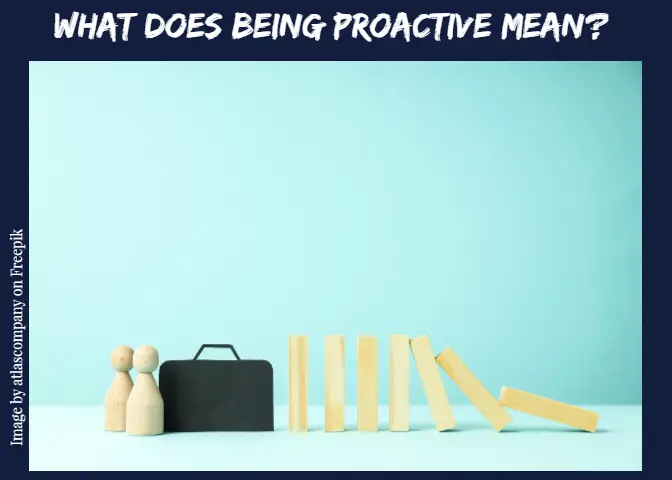
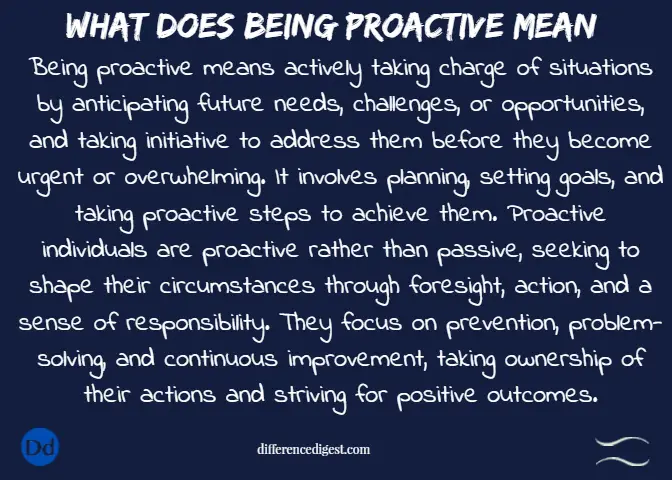
Proactive behavior is the act of taking action before a situation requires it. It involves anticipating potential problems and taking steps to prevent them from happening, rather than simply reacting after the fact. Being proactive means being in control of your life, making deliberate choices based on your values and goals.
One way to become more proactive is by setting clear objectives for yourself. These can be personal or professional goals that you want to achieve within a certain timeframe. Creating an action plan with specific tasks and deadlines will help you stay focused and motivated towards accomplishing these goals.
Another key aspect of being proactive is developing effective time-management skills. This means prioritizing tasks based on their importance and urgency, delegating responsibilities where possible, and avoiding distractions that take away from your productivity.
Being proactive also involves cultivating a positive mindset towards challenges and obstacles. Rather than viewing setbacks as roadblocks, try reframing them as opportunities for growth and learning. Embrace change as an inevitable part of life, rather than resisting it out of fear or uncertainty.
Adopting a proactive mindset can lead to greater success in all areas of life. By taking ownership of your decisions and actions, you’ll find yourself feeling more empowered to navigate through both the good times and the bad with confidence.
Reactive
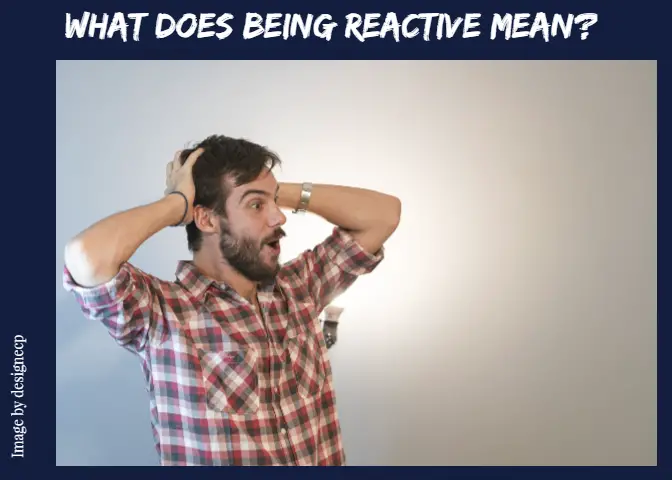
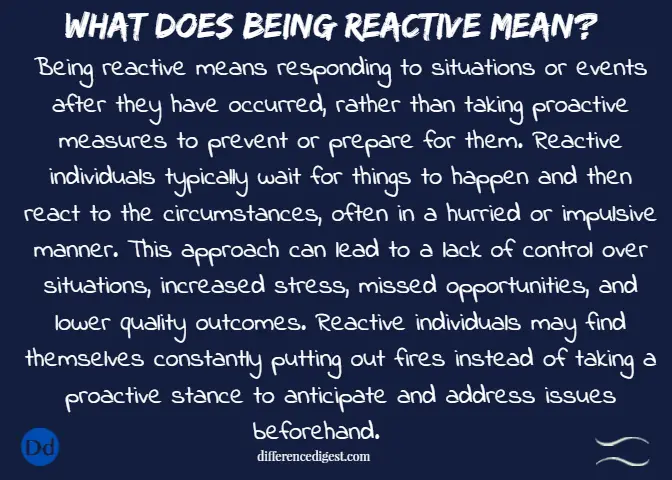
Reactive behavior is characterized by responding to a situation after it has already occurred. It’s like putting out a fire once it has started instead of taking steps to prevent the fire from happening in the first place. Reactive individuals tend to be passive and wait for things to happen before they take action.
One of the main drawbacks of reactive behavior is that it can lead to missed opportunities. When you are always reacting to situations, you may not have time or resources available when an opportunity presents itself. This can result in missed chances for growth or success.
Another negative aspect of being reactive is that it often leads to stress and anxiety. When you are constantly dealing with crises and emergencies, your body goes into fight-or-flight mode, which puts a lot of strain on your mental and physical health.
On the other hand, there may be times when reactive behavior is necessary. For example, if someone suddenly becomes ill or injured, immediate medical attention would be required regardless of any proactive measures taken beforehand.
While reactive behavior might sometimes be unavoidable, striving towards proactive behaviors will help optimize outcomes in most cases – especially those within our control!
Reactive Vs. Proactive – Key differences
Reactive behavior is often a knee-jerk reaction to a situation that has already occurred. This type of behavior involves responding after the fact, rather than taking action beforehand to prevent it from happening in the first place.
On the other hand, proactive behavior involves anticipating potential issues and taking steps to prevent them before they occur. By being proactive, individuals can make informed decisions and take calculated risks based on their knowledge of possible outcomes.
One key difference between reactive and proactive approaches is that reactive behaviors tend to be more short-term focused while proactive behaviors are geared towards long-term success. While reactive measures may provide immediate relief or resolution in a crisis situation, proactivity enhances an individual’s ability to predict problems before they arise.
Another significant difference lies in accountability. Reactive individuals tend to blame external factors for their misfortunes whereas proactive people take ownership of their actions and are willing to accept responsibility for any consequences that may follow.
By understanding these differences, we can identify which approach best suits our needs at any given moment. Whether we choose reactive or proactive measures depends on various factors such as time constraints, resources available, personal preferences etc., but ultimately both have unique advantages and disadvantages depending on the context.
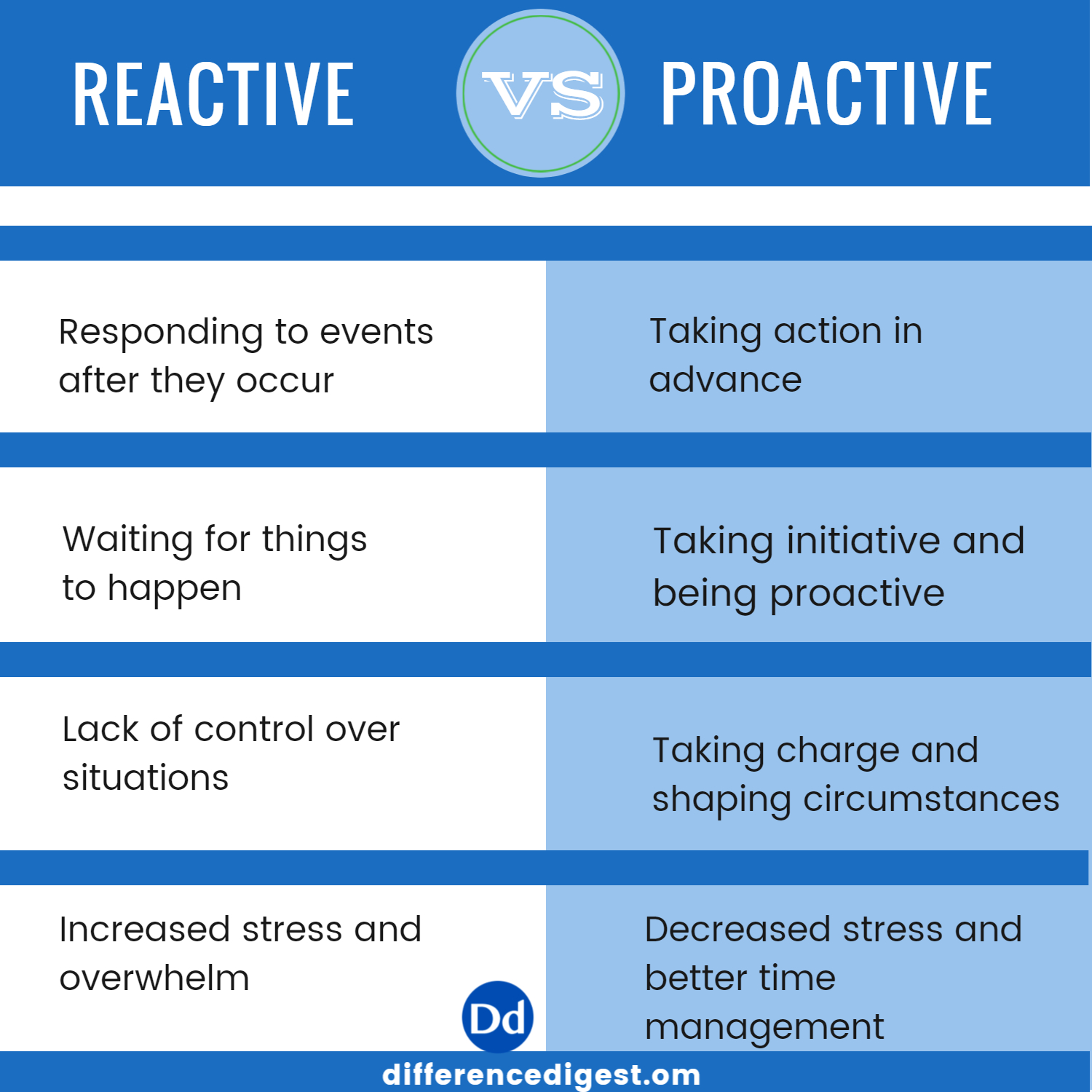
What are some examples of reactive behavior?
Reactive behavior is characterized by responding to a situation after it has happened. It’s the opposite of proactive behavior, which focuses on anticipating potential problems and taking steps to prevent them from occurring.
One example of reactive behavior is procrastination. When we put off important tasks until the last minute, we’re reacting to the pressure of an impending deadline rather than taking action earlier to avoid stress and anxiety.
Another example is waiting until there’s a problem before seeking help or advice. Whether it’s with our health, relationships, or work performance, many people only seek assistance when things have already gone wrong instead of being proactive in preventing issues from arising in the first place.
Reacting emotionally instead of logically is another common form of reactive behavior. This can manifest as lashing out in anger or becoming overwhelmed with worry when faced with a challenge or conflict.
Reactive behavior tends to be more passive and less effective than its proactive counterpart. By recognizing these tendencies in ourselves and working towards adopting a more proactive mindset, we can take control over our lives and achieve greater success and fulfillment.
What are some examples of proactive behavior?
Proactive behavior is all about taking initiative and being prepared for the future. It involves looking ahead, anticipating problems and opportunities, and taking action to ensure a positive outcome. Here are some examples of proactive behavior:
Setting goals that align with your values can be an example of proactive behavior. By doing so, you have a clear direction in mind which motivates you to work towards it.
Staying organized by planning out your tasks in advance helps avoid procrastination and ensures timely completion of projects.
Developing new skills or improving existing ones before they become necessary demonstrates foresight and preparation for upcoming challenges.
Fourthly, maintaining good communication with people around you prevents misunderstandings leading to conflicts in the first place.
Lastly seeking feedback from others on how to improve oneself shows a willingness to learn and grow personally as well as professionally.
Practicing proactive behaviors leads not only personal growth but also improves relationships both at home or work while making room for unexpected opportunities.
The benefits of being proactive
Being proactive has numerous benefits that can positively impact your personal and professional life. One of the biggest advantages is that it enables you to take control of your circumstances, rather than simply reacting to them. By being proactive, you can identify potential problems before they arise and take steps to prevent or mitigate them.
Another benefit of being proactive is that it allows you to prioritize your goals and objectives. When you’re proactive, you have a clear understanding of what needs to be done in order to achieve success, both in the short-term and long-term.
In addition, being proactive often leads to increased efficiency and productivity. This is because when you’re taking action ahead of time, there’s less likelihood of last-minute issues cropping up which could disrupt progress on important tasks.
Furthermore, by adopting a proactive approach in life or work situations, people tend towards becoming more confident as well as self-reliant individuals who are capable enough not only at identifying but also solving their own problems without seeking external help every single time!
Then, whether it’s managing projects or overcoming personal challenges – cultivating proactivity will almost always lead one towards better outcomes than those who merely react!
The drawbacks of being reactive
Reacting to situations instead of proactively taking action can have significant drawbacks. One major issue with reactive behavior is that it often leads to increased stress and anxiety. When we constantly find ourselves in a state of reacting, we’re always playing catch up which can be exhausting both mentally and physically.
Another drawback of being reactive is that it often leads to missed opportunities. We may not notice potential problems or challenges until they become urgent issues that require immediate attention. This can limit our ability to plan ahead and achieve long-term goals.
In addition, reactive behavior tends to be more costly than proactive behavior. The longer we wait to address an issue, the more resources (time, money, etc.) are required to resolve it. In some cases, waiting too long may even result in irreversible damage.
Moreover, being reactive also hinders creativity and innovation because we’re solely focused on addressing current problems rather than finding new solutions before they arise.
While there may be times when reacting is necessary in certain situations; relying on this approach as a default mode of operation can lead us down a path filled with negative consequences.
The benefits of being proactive and The drawbacks of being reactive
| THE BENEFITS OF BEING PROACTIVE | THE DRAWBACKS OF BEING REACTIVE |
|---|---|
| Increased productivity | Increased stress |
| Improved problem-solving abilities | Missed opportunities |
| Enhanced time management | Lack of control over situations |
| Increased opportunities | Decreased productivity |
| Better communication and collaboration | Lower quality outcomes |
| Enhanced self-confidence | Damaged relationships |
| Continuous learning and growth | Limited growth and learning opportunities |
How to become more proactive in your life?
The first step towards becoming more proactive is to identify areas in your life where you tend to be reactive. Do you wait until the last minute to complete tasks or respond to emails? Do you only start planning for events when they are already upon you? Once you have identified these patterns, make a conscious effort to address them.
One effective way of being proactive is by setting goals and creating plans that help you achieve them. Break down larger goals into smaller, actionable steps and set deadlines for each one. This will help keep yourself accountable and track progress towards achieving your goal.
Being proactive also means taking initiative and seeking out opportunities rather than waiting for them to come your way. Practice stepping outside of your comfort zone by volunteering for new projects at work or joining social groups that align with your interests.
It’s important to prioritize self-care as a means of staying energized and motivated. Make sure to take time for yourself each day whether it’s through exercise, meditation or simply doing something that brings joy.
By incorporating these habits into your daily routine, you’ll find yourself becoming more proactive in all aspects of life!
Featured Image by vectorjuice on Freepik









